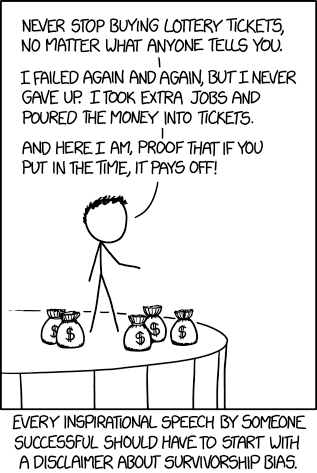Source: XKCD (https://xkcd.com/1827/)
This is disturbingly relevant to those considering medicine, or those already in it. There are countless stories from people who have "made it", sharing their path to medicine and encouraging others to duplicate it. Some of these have merit. Many do not. The problem, as the XKCD comic notes, is the survivorship bias. There are many paths to and through medicine, but some are more risky than others. Those who achieve what could be considered to be a success naturally think they've got the inside track on how to become successful, because hey, it worked for them! I'm definitely guilty of this myself. Yet anecdotes are not data and what works for one person won't necessarily work for all people.
In medicine, the most common example of survivorship bias comes when considering attending medical school outside of Canada. It works for some people, people who are naturally pretty happy with the choice they made. Yet, we don't hear much from those who did not find success at a foreign medical school, who are understandably fairly shy about talking about their failures.
There are countless other situations where this holds true, however. There are many Canadian medical students who took some non-traditional paths to medicine. I did a second degree, for example. Others took comparatively difficult undergrads, such as engineering or art. Yet, while these paths work for some, I wouldn't call them reliable or optimal pathways to medicine.
I'd put CaRMS matching for Canadian medical students into this category as well. Successful candidates share their approach to matching to competitive programs, while those who didn't match, or matched low on their list generally don't share their often-very-similar stories.
The problem is that anecdotal data is often all students have to guide them. There isn't great data out there to say how to get into medical, how to land a good residency spot, or on the outcomes of studying medicine abroad. This is just my small reminder to treat every success story with a grain of salt, and to always, always, always have a reasonably reliable back-up plan in mind. Risk-taking is part of having a good career, as the only paths in life that come with guarantees are ones of mediocrity, yet gambling the future away in hopes of a payoff is never a recommended approach. Take the risks that still leave you standing if they don't work out - so that you can take the next chance that comes your way after that.

No comments:
Post a Comment